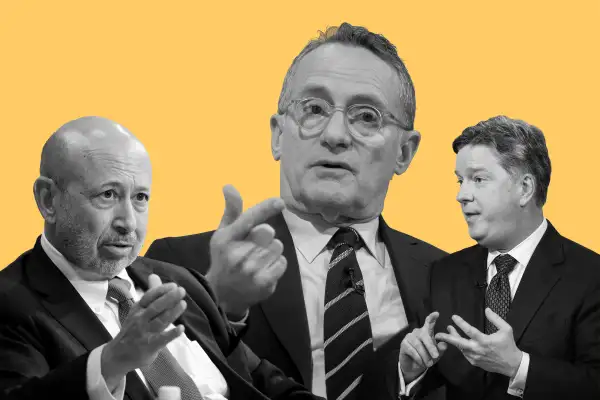'Unnerved': These 5 Big Wall Street Players Are Predicting a Downturn
Money is not a client of any investment adviser featured on this page. The information provided on this page is for educational purposes only and is not intended as investment advice. Money does not offer advisory services.

It's one thing when perpetually gloomy prognosticators — Wall Street permabears like Dr. Doom himself, Marc Faber — predict that a stock market crash is looming.
Now, however, middle-of-the-road strategists on Wall Street are starting to get worried. And that should make you at least a little nervous.
This stock market has been rallying for more than 8-1/2 years, which is more than twice the length of the typical bull market. This is now the second oldest bull in history, and has generated the third best returns since World War II.
On top of all of that, the S&P 500's price/earnings ratio, based on 10 years of averaged profits (a widely used gauge to value the market), is now above 30. The long-term average is around 17. The market has only been this frothy on two other occasions — in the run-up to the Great Depression and in the late 1990s dot-com bubble.
It's no wonder, then, that several prominent Wall Street figures and firms have publicly stated their concerns about how much longer the good times can last.
Among them:
1. Goldman Sachs: 'Unnerved'
Lloyd Blankfein, chairman of the most influential investment bank in the world, said earlier this month that what he sees in the market “unnerves” him.
“Things have been going up for too long,” he said this month at a business conference in Frankfurt.
To be sure, he said this wasn't like "Tulip Mania" — the 17th-century surge in Dutch tulip prices, considered one of the most iconic investment crazes ever. But the market doesn't have to be in an historic bubble for a bull market to come to an end.
2. Wells Fargo: 'Not Bullish'
"We are not bullish on the stock market," Christopher Harvey, Wells Fargo's head of equity strategy, told CNBC last week.
He's not predicting a crash per se. But he thinks the S&P 500 could fall to around 2,475 by year end. Based on its current level, that would represent a 1.2% drop in stock prices between now and the end of the year.
"We think the best of the stock market is behind us, not in front of us," he added.
3. Russell Investments: 'Trim Some Profits'
More than eight years into this bull market, it's time to "trim some of those profits and rebalance," Russell's chief market strategist Stephen Wood told CNBC.
Market valuations have been high for some time now. But he added that "valuations are being decreasingly supported by the fundamentals in the U.S. market."
Russell Investments has a target for the S&P 500 of around 2,300 over the next 12 months — suggesting a stock market decline of about 8%.
4. Oaktree Capital Management: 'Time for Caution'
In a letter to his shareholders in late July, Oaktree founder Howard Marks noted that "asset prices are high across the board. Almost nothing can be bought below its intrinsic value, and there are few bargains. In general the best we can do is look for things that are less over-priced than others."
That's hardly a positive environment for value-minded investors.
Marks went on to add: "Given my view of the environment, the only reason to be aggressive today is because defensive investing implies low prospective returns. But the question is whether pursuing high expected returns through aggressiveness can be counted on to be rewarded. If the answer is no, as I believe, then this is a time for caution."
5. Raymond James: 'Not Much Upside'
The brokerage firm's chief investment strategist Jeff Saut recently noted that "most of the indices we monitor have moved from neutral, or oversold, into an overbought condition on a short-term basis."
Translation: "There just is not much 'upside energy' right here," he said. As a result, he added, this may not be the best time to "buy on the dips" — as investors have done for much of this bull run.
